The USA Rail Pass
07-10-2024
Whoah, smokestack lightnin' Shinin' just like gold [...] Whoa-ah, stop your train Let a poor boy ride Why don't ya hear me cryin'? 'Whoo-oo, whoo-oo... whoo' - Howlin' Wolf, 1956 The existence of the phrase “flyover country” should be considered offensive to every American. For the era of commercial aviation has not been kind to the portions of this continent where the soul of the American nation was formed; the grassy world of bluffs and plains whose soft kiss lay at the center of our mythos as a nation is now considered an inconvenience to pass through. Its inhabitants are often derided as cultureless, irrelevant, or regressive, and indeed, a great many residents of the United States — I hesitate to use the term ‘Americans’ to describe them — would describe a multi-day voyage across the heartland as being both “boring” and “a waste of time.” But without question, the overland voyage across America — from sea to shining sea — should be considered spiritually requisite by all who call this nation home. Even for those without any sentimentality or patriotism for this country and even for those with a strong aversion toward travel, the simplest way to understand America is to pass through her. 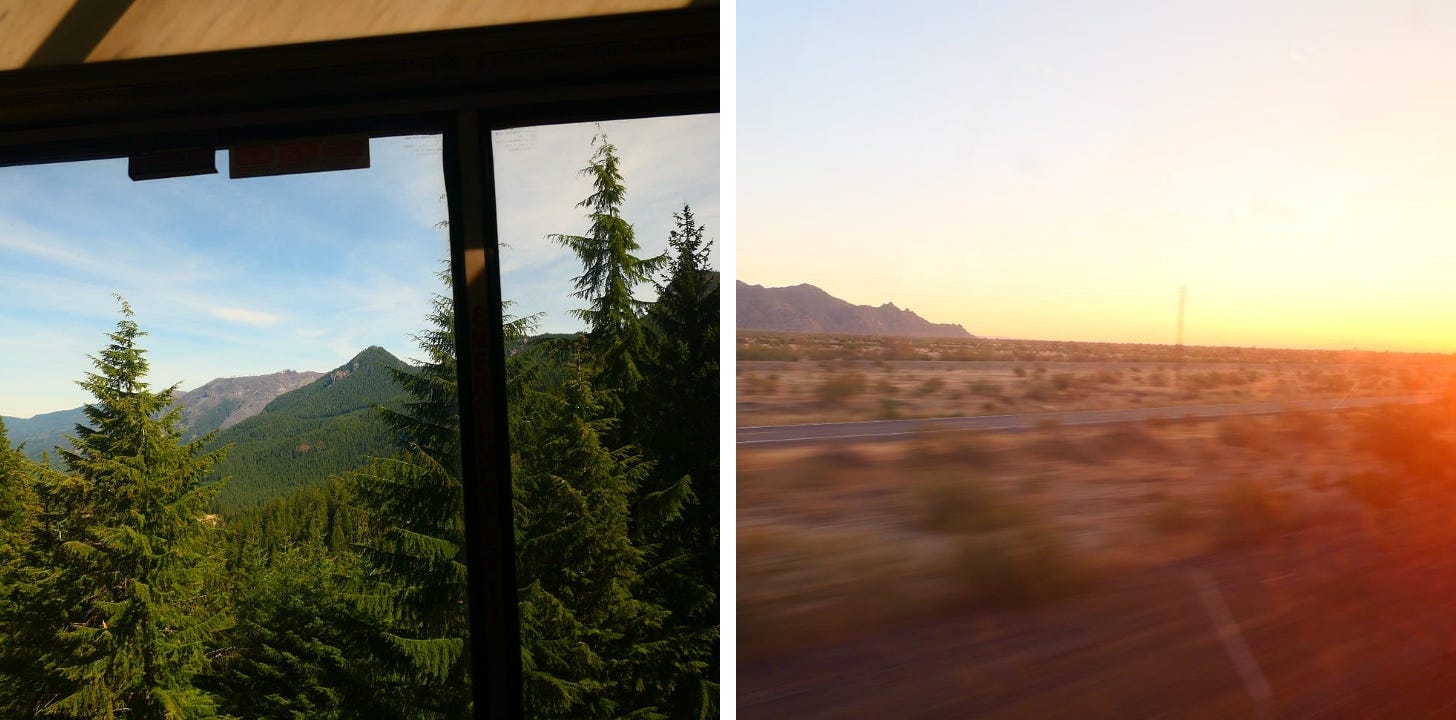 Classically, such a journey began on the Atlantic side, where eastern density reigns and harried men move together as tightly as grey bricks — and far off through one’s dizzied peripheral view, they see the shimmering harbors and bays of Boston or Hartford or Manhattan. The shale shores on which the obelisks of busy-ness have been erected sigh below their weight; its wall of subterranean stone sighs like an exhausted matron — Mother of America. And above her, her children, all sprinting and babbling, all narrowing their eyes as they chart a path through the throng, stepping over drunkards and the stained concrete. Lamb meat spins in a smoking cart — a toothless man howls in Chinese into his wireless earbuds. Frail, rich women in tights say nothing as they wait for their trains; an overweight desk jockey from New Jersey barks at a sleep-deprived city worker who looks half-dead. Yes, to leave from this place is only natural; one sees a photograph of old Rocky Top or Oregon Territory and a westward magnetism may grab them rudely. Dreams swirl — ah, to lay one’s gaunt billfold down on the counters of sharklike land salesmen hawking dessicated ranches under Dakotan skies for a chance at Western grandeur. One cannot discern the bleakness of Dakota from this world of avenues and expensive blocks of stone. But out one must go — out West. And then what began as a mere Western whimsy becomes real as you sidle up to the platform with rucksack and ticket in hand. You enter the metal tube bearing the word “AMTRAK” as a seed enters the stomach of a migratory bird. In its bowels of steel you recline in princely repose, coffee in hand, gazing out the windows as the lull of the track rocks you into a somnambulant state — as if you were America’s own child, falling into a nap as you hear and see a long, splendid story. Wetlands, river, white churches with lights off and doors locked, Jersey arterials, sleeping towns and commuter rail stations, rising hills in the distance — all vague, all dreamlike, wrapped in twilight’s half-glowing fog; the preamble to dreaming, the story of a nation. That story gleams through the train’s windows like a triumph and a poem. Soliloquies of hardship belt from Appalachian ridges and the tunnels of trees which arch above the tracks of gnarled steel — and all at the same time, as if a chord struck by a harpist, hymns of heaven ring out alongside sorrow, and the land rises and falls like the prayers of the Priest and the peals and cackles of bumbling babies rolling in the earth’s bluegrass fur. You are bound for the Pacific, tracing westward line after westward line, weighing the gravity of each successive wave of national vigor and youth, all howling for opportunity in their heavy, humid fevers, sloughing off the scrofulous vapors of the Old World — braving diphtheria and hunger, reaching high across ancient foothills of stone, fighting for an acre of hardscrabble in which to offer one’s prayers and plant roots for ones’ sober-eyed daughters and sons all swaddled in ragged flax and cotton. And in time, the land mellows into a torrent of speeding green earth, all of it flat and criss-crossed with streams and rivers. Cities of brick, smokestacks on the prairies, oaks and cottonwoods all sentinel-like on the embankments of doddering brown rivers. The trees thin slowly at first and then all at once; one sees a world of sod and powerlines, dusty trails and roads and lonesome houses in grottoes of mercurial rainclouds — or crowned by a chorus of heavenly cottonballs hung high in God’s panoramic skies. To the Easterner and the West-Coast urbanite alike, these realms are alien — a world where only a desperate man could drag his oxen and his barefoot children with any hope at all. And yet it is a world where desperation was converted into extreme optimism and holiness as a matter of course. For days one rolls through this world, finding it perhaps a touch harrowing or distasteful at first blush — but if they are studious observers of these plains and their effect on the American soul, they may find that there is a potent magnetism to this world of sod. Its gravity pins you down — the lonesome feeling that one tastes in grasping its emptiness might send a European into a paroxysm of fear or worry. But one finds a true American within themselves if they stare into it and believe — if they taste the peculiar faith that this landscape imparts. One needn’t be a sentimentalist to see this at all; to the contrary, I have seen Amtrak passengers of a thoroughly metropolitan disposition reduced to wordless wonder by the sight of these unending plains, as if finally coming to understand a hidden and precious thing buried deep within themselves. When the Rocky Mountains rise from the perfect flatness of the land, rising gently at first and then towering into view — they seem almost like a hallucination. In surveying them, the easterner — who has at this point been train-bound for two days at the very least — might assume, falsely, that the Pacific ocean is surely right on the other side of those mountains. To their great shock, just on the other side of them is only an ocean of dry, dreamlike rock formations and red stone canyons — a world of sand and salt and dessicated void, a world where a very few leather-faced men still walk as nimble-handed stewards and roustabouts, humbled forever by the empty world surrounding their small, proud, sturdy old homes. 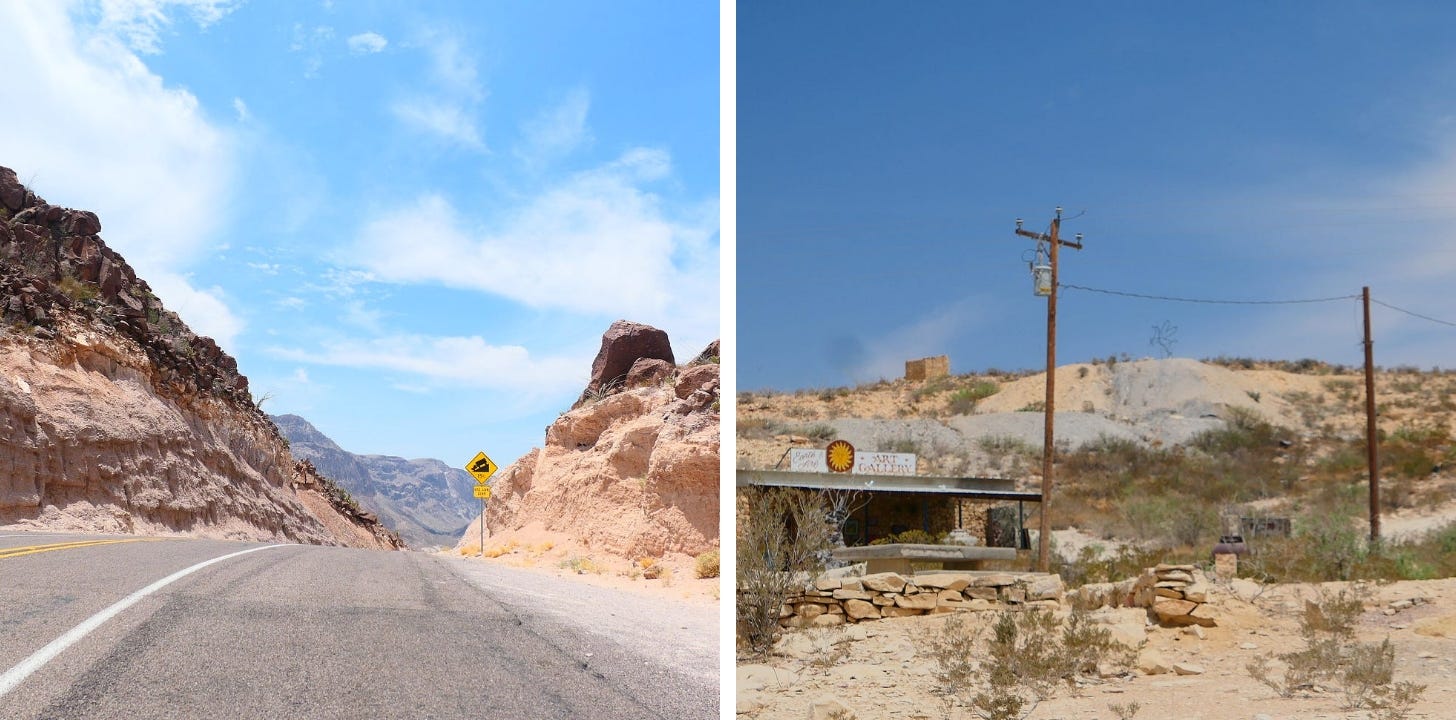 This goes on, and on, and on, the train all the while sprinting as she sips her diesel with ladylike prudence, and the shining rails of steel span across the landscape as a testament to man’s obsessive, implacable effort to run ever westward by locomotive. Often, the rails are the only visual clue that mankind has ever been here before. The train feels like a village on wheels, an oasis of civilization in a barbarous province — and one notices the faces on the train, all of them differing as substantially as the land of this country can and does differ. Mennonites and Amish with coolers and sandwiches and straw hats; black boys from Tulsa and retirees from Toledo sharing donuts — men with Norwegian faces and lips stuffed with tobacco, young ladies who gingerly sip their wine beside their pasty, grinning grandmothers. Shifty drunks mumbling obscenities, Quakers, Natives, preachers, and always, red-eyed conductors telling old, reliable jokes. All of them mix in the observation car, all of them together as a small and extemporaneous village — and, chortling over beer and coffee and cookies, they take one another as temporary friends, speaking long and in-depth, trading life stories in the fullest and most complete rendition. And by the time these conversations are at their climax, the train ascends the Sierra Nevada, dashing gracefully toward the Pacific Coast. “This is where the Donner Party ate each other,” a man says. “Well I’m glad we came by train instead of horse-wagon,” a boy says. “There are hot dogs here — much better eating than you’d probably be!” The descent begins again, down into the fruited plains of the Central Valley, up again over the coastal mountains. Finally, as the waters of the Western ocean flit in and out of view, the train conductor announces the last and final stop, and as the brakes grind to a halt, the conductor practically does a curtsy, knowing that his work has been to put on one of the most incredible shows in the world. The passengers detrain after nearly four days of continuous travel — as exhausted as they are exhilarated. Strolling about San Francisco in a fugue, one comes to recognize — if they’ve been attentive, anyway — that they left a great deal of whatever they once thought about America behind along the rails. Only the dimmest of men can pass overland along these United States in their entirety without coming to appreciate the American story in its most maximal form. 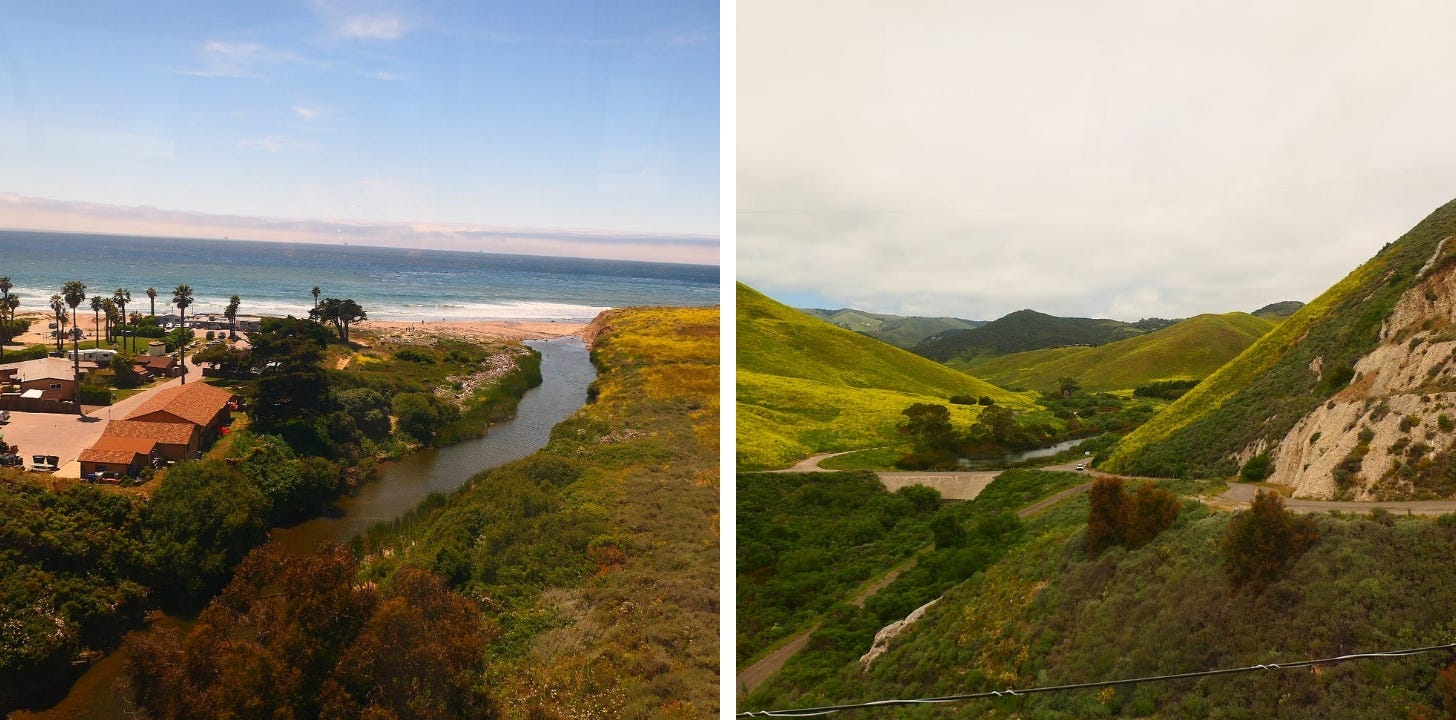 Most detrain at their last stop with something renewed in them — a thing far too often ignored, a romantic, breathing organism that must be refreshed and watered and cared for. That thing is our country. In the year 1870, when the Transcontinental passenger train system first came into service, this journey would’ve cost anywhere from $1,555 (for a hard, wooden ‘Emigrant Class’ coach bench) to $3,255 (for a plush first-class sleeper) in today’s dollars. But these days, the train conductor can afford to let a poor boy ride. Amtrak’s USA Rail Pass now sells for the sum of $499 — an accessible sum by the standards of any prudent, working American. The pass grants one the ability to take any ten trips in a thirty-day period on almost any line in coach class. Each of these trips is described in Amtrak’s official Rail Pass jargon as a ‘segment’. In essence, any time a Rail Pass holder boards and disembarks a train, they’ve used a ‘segment’. That is to say, if they’re ticketed on any journey that requires a transfer from one train to another, they’ll use two segments. There are also a few exclusions worth knowing about — the USA Rail Pass cannot be used on the Acela, Auto Train, Amtrak Thruway Bus services in series 7000 - 7999 (but all other series of Thruway buses can be used), and cannot be used for an international border crossing into Canada’s VIA Rail system. It should also be noted that USA Rail Pass segments can only be booked on trains that are less than 80% full at the time of booking. Once that threshold is reached, Amtrak’s online system prohibits bookings for Rail Pass holders. This is of great importance to anyone who might wish to “book as they go” rather than booking all segments well in advance. It’s worth mentioning that one may or may not be able to book segments on >80% full trains by calling Amtrak’s customer service line — for irregular, spur-of-the-moment bookings, telephone agents seem to have a bit more power than ticketed customers do in the online interface. Additionally, the USA Rail Pass is for coach only, meaning no upgrades to Business class or sleeper cars are available unless you’re willing to purchase a second ticket. Finally, the pass cannot be used at the same stop on the same line more than once in thirty days — meaning you cannot travel back and forth between two cities repeatedly. This is ostensibly done to maintain the pass as an essentially touristic affair rather than a ticket used by commuters. Outside of these decidedly minimal prohibitions and policies, the rail pass allows for use of the entire 21,000-mile Amtrak system, including most connecting buses, all for the low price of $499. This is the sort of deal the penny-pinching buzzard in me could not resist. I purchased one with the full intent of getting my money’s worth — and I am pleased to report that I absolutely did. The gargantuan marble-columned Utica train station sleeps like silver spoons in a dusty drawer of a great house. The bones of Utica have the smell and patina of old finery laid out at an estate sale in a great and crumbling chateau; its patrons long dead or doddering — if one walks quietly, they can hear their ghosts. I sip a porter at the trackside pub, staring out into the maze of empty streets as the pub’s speakers play the song Allstar, an upbeat tune released in 1999 by the one-hit-wonder band Smashmouth. And the barkeep looks as if the year 1999 never ended; cigarette smoke curling around his blonde frosted tip hairdo, leaning against the brick walls of the tavern’s courtyard in his sunglasses and FUBU-brand track jacket, kicking at the dirt in his stained white Reeboks.  No one else is at the bar — one wonders if Utica is being maintained in North Korean style, subsidized by the state to keep up appearances, spray-painted to the ‘uncanny valley’ hue of sham vitality lest a train passenger should step off for a smoke break and start asking too many questions. I ponder this as the song continues — “Hey now, you’re an All-star, get your game on on, go play // hey now, you’re a rockstar, get the show on, get paid..” The barkeep ashes his cigarette and glowers, casting furtive glances toward the empty bar. I pay the tab, glad to be departing this weird, empty place in the heart of American Pyongyang — where one gets the disturbing sense that they may be being watched. The train arrives, and Keturah is with me. If Amtrak’s Lake Shore Limited were one’s first introduction to the Amtrak system they might get the impression that it’s a long, metal, track-bound Greyhound bus. The passengers are sullen and bored with earbuds universally donned. Cheerio dust covers our seat, and a heavy-set hustler-looking character in an Eminem t-shirt is sawing wood, snoring deeply, displaying all of the textbook symptoms of undiagnosed sleep apnea. Worst of all, the train’s bright white lights — the sorts of fluorescent lights one sees inside of hospitals and Wal-Marts — stay on all night, angled directly into our eyes, and we fitfully sleep as the train rattles at 110mph all the way to Chicago. The trip takes fifteen hours. For Keturah and I, this ride is our last bit of time together before separating for a month. We’d both been taken with the romantic idea of parting ways for a few weeks before our wedding — and at Chicago, she’d head to southern Illinois to see her great-grandmother, and I’d jump aboard the City of New Orleans train to soak in the sinful humidity of the Crescent City. From there, I’d run a nearly 8,000-mile circuit around the United States — and if the trains ran on time, I’d arrive at our wedding in Upstate New York on time. Sleepy-eyed and rueing our separation, I saw her off onto her train. I wandered Chicago’s Union Station alone, rattled by the gravity of her absence already, and several hours later, I hopped onto my own southbound train, dreaming of the woman who would become my wife. A ‘vibe shift’ takes place as I step aboard The City of New Orleans. The workers are a jazzy bunch, obviously natives of the city below sea level, all of them jocular and energetic; smooth Louisiana tones drip from their smiling craws — “good evening baby, we don’t mind you playing music in the cafe car — but if it’s the nighttime hours it had bettuh be smooth!” Unlike the Lake Shore Limited, this train is equipped with a ‘Superliner’ viewer car with domed glass windows that afford passengers views of the scenery. Most long-distance routes are equipped with these — except the routes that go in and out of New York City, as the train tunnels there don’t have the clearance for these tall double-decker cars. But the view of the scenery doesn’t matter much on the ride south through Illinois and Mississippi. This stretch of track is, in the colorful words of one especially talkative train attendant, “a damned old tunnel of green trees and shit.” Nonetheless this ‘tunnel’ had a soothing effect as we sped southward, and I crawled down under the Superliner’s benches to sleep. 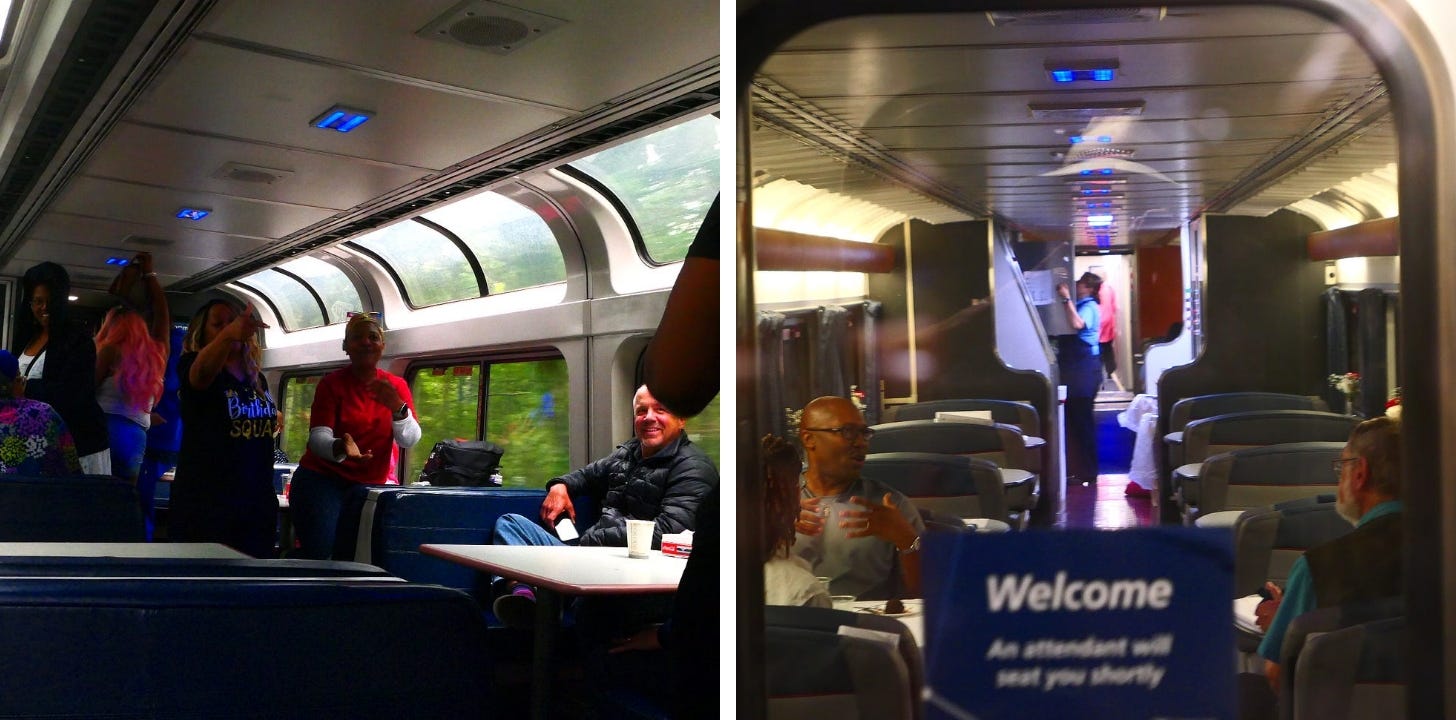 In New Orleans, I had the great pleasure of staying with one C. Sandbatch, a native son of New Orleans, and Covington, and Mississippi, and Kentucky, and, well — practically every location in the American South but Alabama or Georgia. A polymath of Southern geography, history, and literature, Mr. Sandbatch quite naturally opened his home to me, offering the air mattress in his high-ceilinged back room as organically as the forest offers its glens and creek-beds to a transient jackrabbit or wren. And quite naturally, he stationed himself upon the porch of his sparsely-decorated shotgun shack house, musing on his weirder years, relating tales of corrupt Parish Presidents and bayou dramas, and offering reflections on the more nuanced elements of Deep South race relations, New Orleans musical genre-bending, and Southern ecology. Leaning back onto the wood of the old porch — which had been under some eleven feet of water during Hurricane Katrina — I listened to him speak in slow, eloquent tones as the breeze rustled the palms on the street. His cigarette smoke hung above the sleepy-eyed cats, and the wine in my cup was lukewarm in the humidity. We drove all over the city in his ailing old jeep, a vehicle whose transmission had the habit of ‘burping’ in traffic, and we flitted in and out of cafes and bars, each of which seemed to be a sort of checkpoint in Mr. Sandbatch’s memory. Wistfully he drank as he spoke, and I felt myself slipping into the ease one knows only when wandering a city with one of its own sons. But morning came on the third day, and the Sunset Limited was due to take me to Texas.  Rising from Mr. Sandbatch’s air mattress and packing my things was unnatural to me in some regard — I am used to the freewheeling world of hitchhiking, where there is no schedule to follow at all. For years of my life, I never knew what time it was, nor did I know what day of the week it was. I’d see fireworks and a vague thought would dawn on me — “… July, then? Must be…” On the Amtrak, however, no such luxuries regarding date and time can be tolerated — the train runs on a schedule, and you’ve got to be waiting at the station when that whistle blows. This is true even if the train is waylaid, late, delayed, or even cancelled; it is true even if one is hungover, indebted, in love, has a warrant, comes up cashless or is struck with a crippling injury. The show must go on — and while I was blessedly spared any ill fate that would prevent my timely arrival at the station, I was nontheless rankled by the requirement that I obey time so precisely, and I count this among the very few real drawbacks of train travel. Amtrak, of course, is notorious for not obeying time with any great precision. Trains are often comedically late. And much like the Amtrak’s methhead cousin — the Greyhound bus system — entrance into one of its stations is to approach the altar of a fickle god; one arrives with tension in their stomach, a wariness. The seasoned train traveler expects a circus and is only relieved when he is seated upon the train, verifying that all is going as it should be by watching the earth roll beneath him, checking his compass to ensure he is making way in the right direction. Heavy rains had disabled the track from New Orleans to Houston. These rails are slung low along a giant maze of bayous within inches of sea level; even a half-inch of upstream rain can render them impassable. Opprobrium broke out among the westbound passengers when the conductor informed us that the track was closed — but immediately, the loudest of the Amtrak staff held ‘order in the court’ before the befuddled mob, half-screaming that arrangements with a bus company had been made to deliver us to Houston. “Aw shit,” an old woman drawled. “Them buses always late.” But valliantly, the Hotard Coachlines bus sped into the station’s cul-de-sac, and her driver leapt out. He wore mirrored sunglasses and a tight tie, looking like an African warlord in a witness protection program. A line formed — I ran towards it, standing awkwardly, wondering what the procedure would be like. I was handed a blank slip of paper and motioned to a second line, where my ticket was scanned, and the Amtrak conductor pointed toward the bus with his chin. An immigrant was next to me, pantomiming whatever I did — the confusion of this bus boarding process was convoluted enough for a native English speaker, all of us running about the parking lot like chickens, bumping into one another as if this were all some kind of strange improvisational dance. For the immigrant, it was deeply concerning. The warlord-looking busdriver took everyone’s bags and chucked them into the holds below and, strangely, I was given another sheet of blank paper. Finally, I climbed aboard, seated beside a wincing septugenarian bloke from Australia. Complimentary snack baggies were handed out — brownie chips, gummies, 4-ounce bottles of water that a grown man can consume in a single mouthful. The Aussie wouldn’t eat the brownie chips — “GMO’s, y’see. Banned in Oz. Dunno how Americans eat this bloody trash.” I couldn’t disagree — but I ate them anyway. Six hours later, two busloads of would-be train passengers unloaded their personal effects into the tiny, doublewide-trailer-sized Houston train station all at once. The miniature station bore no signs of America’s formerly glorious train stations — this building was an afterthought, a shanty. Everyone’s belongings piled up in the station gave it the aura of a FEMA camp; humidity wafted below the drop ceiling panels, fogging up the lights — an Amtrak agent began distributing soggy, plastic-wrapped sandwiches for free. Minutes later, a retired Arizonan geologist with long, draping, lizardlike wrinkles sent me and a half-mute drifter over to the bar at a nearby yuppie mini-mall on a mission for beers. The mini-mall was packed with suntanned blondes and suave, tense hombres, and the barmaid was confused by our giant drink order. She awkwardly poured the beers, staring at us two haggard strangers. Just as she went to stop us from taking open containers outside of the bar area, the mute guy wagged his eyebrows and slipped her twenty bucks — we’d just bribed a Texas mini-mall bar tender to let us traffick eight open containers out to the station, where it was illegal to drink. Our leather-faced geologist was thrilled, and we slugged our beers with impunity in the sun — the mute guy smirked wordlessly, and the geologist talked at exhaustive length about how his love of the desert. The train engine kicked on in the distance, and the horde began to assemble at the gates. We chugged, shambling through the chaos of the packed station, finally worming our way onto the Sunset Limited train that would deliver us across the giant state of Texas toward the Pacific Ocean. The single most important factor in determining one’s experience aboard an Amtrak train is the conductor. Riding train after train, the differences — some subtle, some appallingly overt — are clear to observe, and virtually all of them are governed by the conductor’s disposition toward his or her job. On this particular run of the Sunset Limited, our conductor was a morbidly obese woman from some working-class backwater of Los Angeles. Her attitude was theatrically stern; she barked orders at all present like a commandante, saying things like “you are to remain in your seats UNTIL TOLD OTHERWISE. Again, I emphasize for those who might already be NAPPING — remain in your seats until I PERSONALLY inform you that you are free to move about the train.” An elderly Vietnam veteran smirked at this incongruously intense display of authority, and in the tone of a classroom clown, said “Ma’am, is this train bound for LA or back to boot camp? I don’t want to go back to boot camp again, ma’am.” Chuckles abounded throughout the car — but the musculature of her face froze white with rage. The train began to roll, and after barking a few more orders, she was gone, and the rest of us were free to move about as we liked. And we rolled across Texas, an experience I wrote about here. I had been humbled enough by my stay with Mr. Sandbatch in New Orleans, a man who was a stranger to me until the moment he picked me up from the station. He generously let me stay at his place for a few days, and I was grateful for it. I had expected his kindness to be an anomaly on this trip — but it was only the beginning. Just before departing Houston for Alpine, Texas, I received a direct message from another stranger on Twitter: “There’ll be a van in the parking lot at the station in Alpine when you get there. The keys are under the floor mat — and there’s ice water in a jug in the passenger seat. I took out all the back seats and put a mattress in there. Enjoy!” A man I had never met or interacted with in my life had decided to lend me a spare automobile for my six days in West Texas. I was blown away. It was beginning to feel as if I was crowdsurfing across the United States — carried across the country by the generosity of unknown men from all across the internet. The chariot of my patron was a Honda minivan — the precise make and model of my old van, the one I sold this past Easter. She purred down the shimmering Texas asphalt, carrying me nearly as speedily as the Amtrak down the utterly empty desert highway to Presidio, Texas. Presidio is a strange, isolated outpost; a bastion of Mexican culture nestled within the confluence of the fledging Rio Grande and the Mexican Rio Conchos. There, no one addressed me in English. Businesses had ill-defined hours; every resident seemed to understand a rhythmic score of time that no outsider would know. Homes hung silent in the dusty air, built directly on the sand along informal, nameless truck trails — their occupants taking siestas, seldom seen in the daytime heat of 101 degrees. My motel room had a view of Ojinaga, Mexico, and the three palm trees for which the Three Palms Inn is named. I sat on the second-floor porch overlooking the desolation, far from anywhere, hidden. The feeling such a tableau imparts upon the heart is half of what I’m ever after in my own travels; absconding into the depths of some empty, little-known region, perched like a raven at the roost, unfindable, unseen. I stayed for a few days and wrote, rambling over to Redford, driving the world-famous River Road to Lajitas and Terlingua. The landscape made me raw and silent. I laid to rest old griefs along the Rio Grande, shedding tears for long-gone years, purifying myself before marriage in an ancient sort of way.  But this venture south to la frontera was strange to me. Solito, rambling alone in an automobile, I felt the sharp contrast between automotive travel and train travel. On the train, I was never alone; I was in a continuous conversation with an eccentric demographic of American travelers — liberated from the paralyzing freedom of choice that accompanies travel by car. On the train, I was simply in transit, one could check on my status as one checks the status of a mailed parcel — no volition was required, and I lounged in the lounge-car with others who shared my track-bound fate. In Terlingua, I spoke to no one — in Presidio, I was a distant stranger. And in Lajitas, the only one I spoke with was the Mayor — who happens to be a goat. 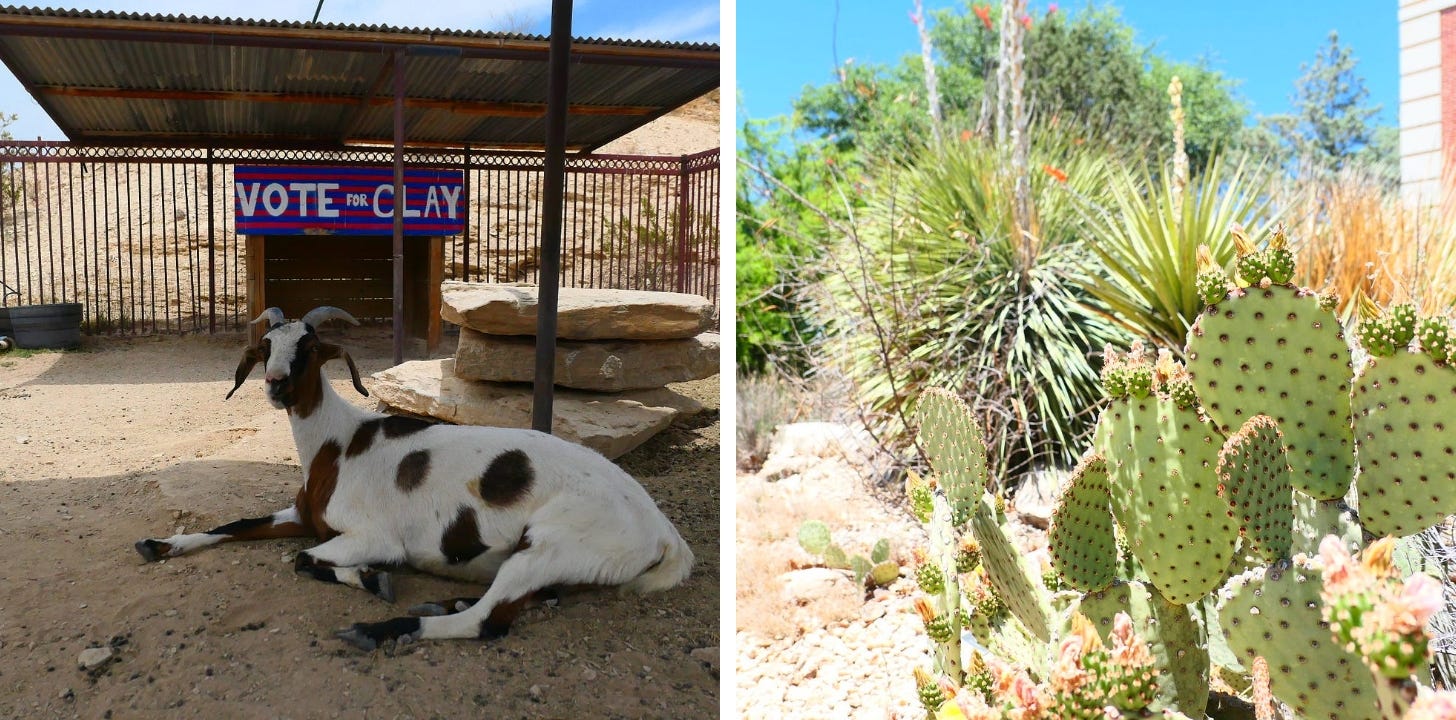 Soon the train’s schedule began to weigh on me. I realized I was driving empty, isolated highways alone, in a vehicle whose quirks I did not know, far from anyone in a sweltering void. Though I am hardly a stranger to transiting through desolate country, West Texas was the hardest of hard liquor as desolate places go. There was something somber about the feeling of passing hours this way, far from the comfort of Amtrak’s Superliner viewer cars, where the conductors hammed it up and slung paper cups of coffee. After a few days on the border, I headed back to Alpine, passing the evening at a rough old trackside bar, quaffing $2 Tecates and talking long with lonesome boys who worked out in the empty desert. One told me of his woes for hours, rambling about Texas, about leaving East Texas, about his ex-girlfriend’s heartbreaking choice to get a doctorate in Spain, where she would no doubt cavort with that distant world’s sultry Don Juans, far away from his dear old Texas. He’d continue to work on drainage projects with pick and shovel, and he’d be here at this bar indefinitely on a nightly basis, wondering what to do with himself. “But I’ll damn sure never leave Texas. I don’t care to go anywhere else. I guess it’s fair to say at the end of it all that I just love Texas more than I love her. Maybe that ain’t right. Hell, maybe that really just ain’t right.” 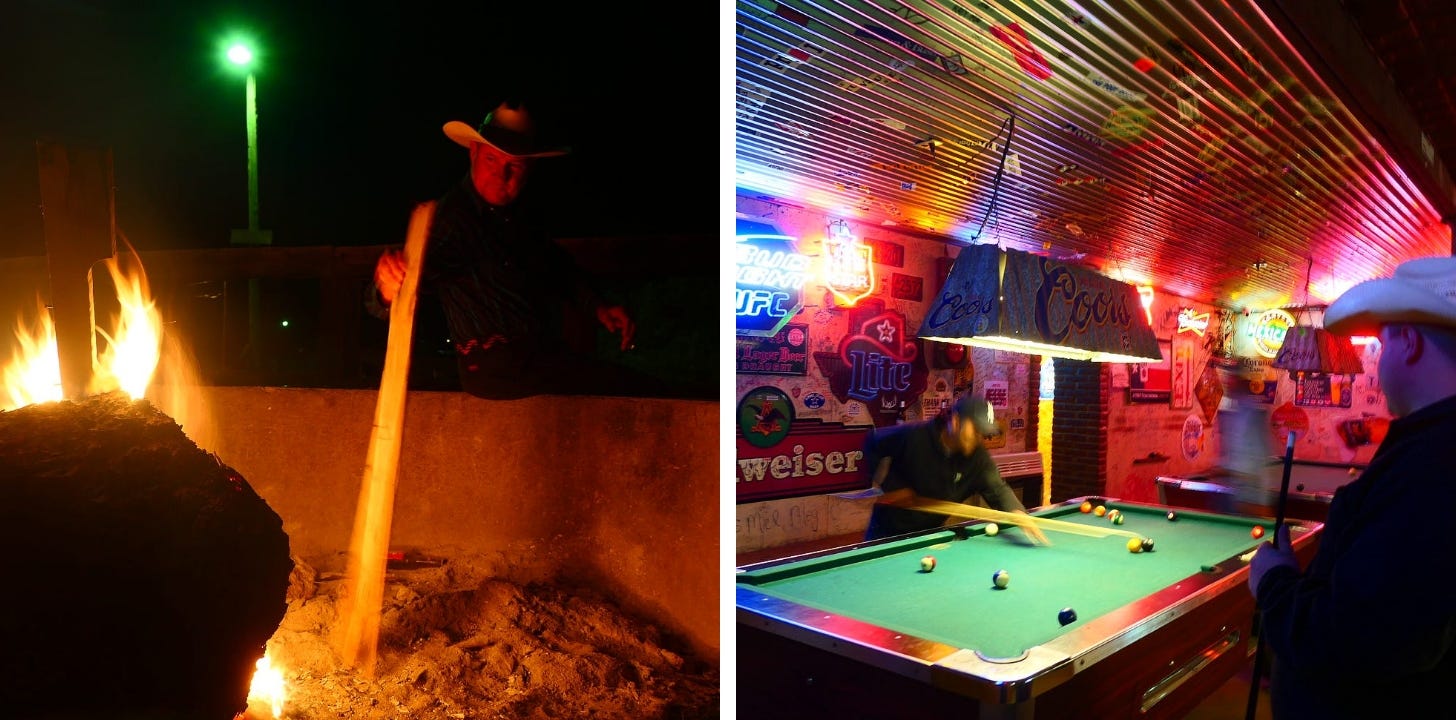 I slept in the van outside the bar, head spinning with gratitude that I was in love — that I was lucky enough to soon be married, permanently spared from that sad man’s distressing fate. Awakening, my eyes tasted the brilliant blossoms of the cacti on which the birds danced as if in high fever for the dusty skies and buzzing bushes, and I realized I ought to hustle to the station to await my train. I cleaned the van, filled the gas tank, wrote a note to my generous benefactor, and slipped the keys back under the floor mats. As I shouldered my pack and sauntered up to the station, two sorry-looking men sat, hacking and coughing over cigarette butts. “They left us, man, they fuckin’ left us. Thought we had time to go buy some liquor, but we fuckin’ didn’t, man.” The two had been stuck in Alpine for three days, as the Sunset Limited only runs a couple times each week. As their westbound train steamed ahead, it went with their baggage, their wallets, and their promise of being in Los Angeles in another twenty-one hours. The men found trashbags and cardboard, begged for McDoubles at the Golden Arches, and pulled half-smoked Marlboros out of the public ashtrays, trapped in a Dickensian desert dream by the train’s attempt to stay on schedule. The toothless one spoke up, speaking between hacks and coughs: “Them boys have GOT to let us on, man, we ain’t got money. Do you think they’ll let us on? The people on the phone gave us a confirmation number and everything, you think it’ll work?” I knew it wouldn’t — but I didn’t have the heart to tell them that. Perhaps if these men didn’t seem so visibly filthy and strung out, the conductor would have mercy, but in their case, I doubted they had a chance. And sure enough, as I strode up the train’s steel steps, I looked out the window to find them screaming in tones of indignation at the conductor, who stood with crossed arms in the rising sun, his sunglasses flashing with the surety of a man who has said “no”. The train pulled off, and these men were left to their despair. There are, however, worse fates a down-and-out man can suffer from the Amtrak’s gallant sprint across the desert. The train moves nearly without brakes, speeding at one-hundred-miles per hour across the sandy void, moving so unstoppably fast that it can even kill Jesus more swiftly than any Roman soldier. For later that day in Fabens, Texas, our train struck and killed 45-year-old Jesus Vega as he attempted to cross the tracks on a bicycle. It is alleged the man was a troubled man and a drunkard by at least one passenger familiar with the ins-and-outs of Fabens; years before, Mr. Vega was arrested and imprisoned for animal cruelty — having mercilessly whacked a cat against a telephone pole until it gave up the ghost. 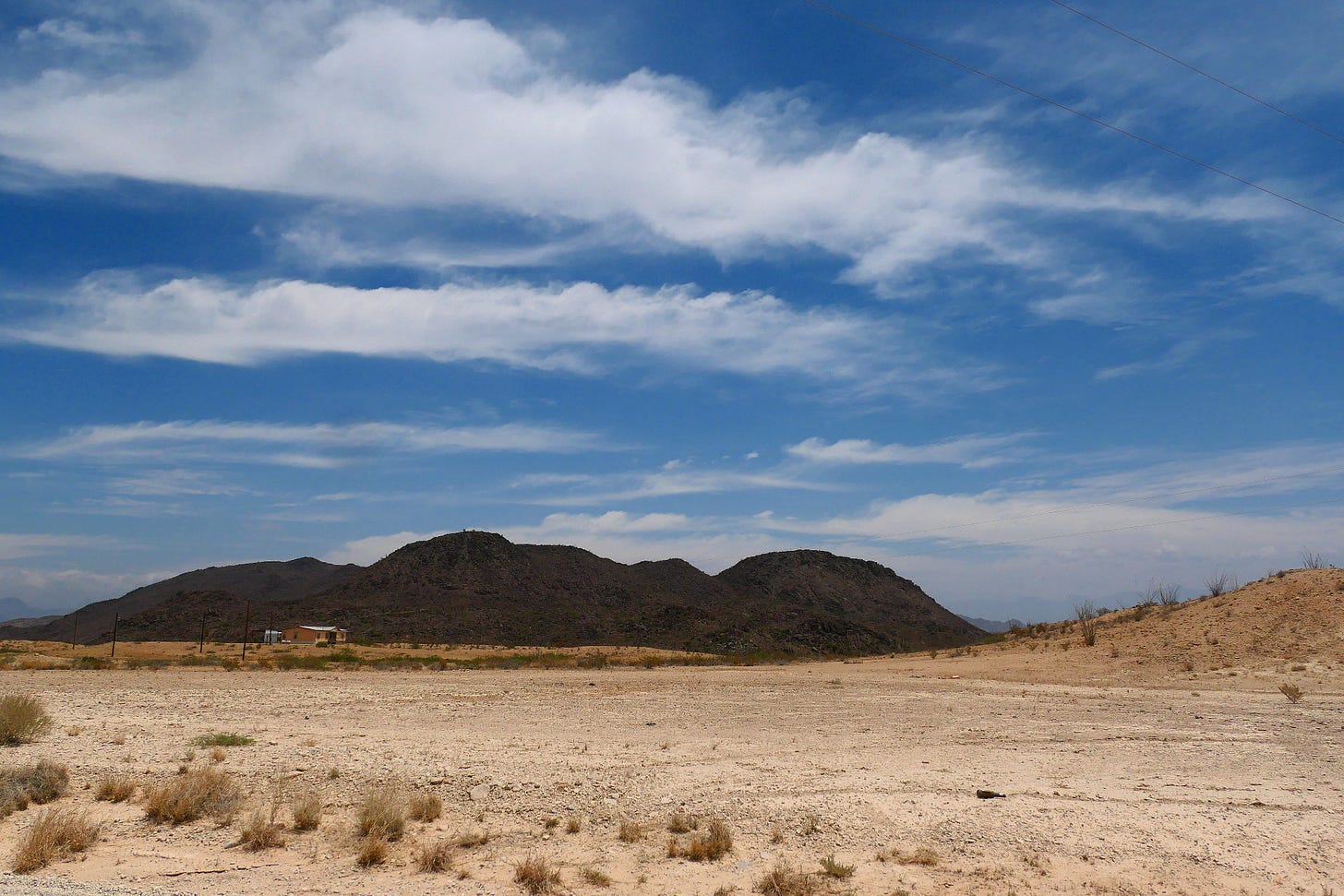 The first sign of trouble aboard the train came when the smell of burning rubber wafted throughout the cars — the brakes had kicked on suddenly, bringing the train to a slow, rolling, absent-minded halt. We sat for a half hour until the announcement came on — “Ladies and gentlemen, we are experiencing an unplanned delay due to a trespasser coming into contact with the train equipment.” And old woman from Ohio piped up: “What does that mean??” I looked over, reticent to say the truth: “Ma’am, I believe what he just said is a grim euphemism for death. The train has struck and almost certainly killed a man.” Stunned, the old bird made the Sign of the Cross, which reminded me to follow suit. I prayed a silent Hail Mary for the man’s soul — but my seatmate was having none of it. He was a sharp-witted man in the middle of his middle years; a suntanned, shiny-bald, healthy-looking fellow with a penchant for “Bronze Age Pervert” podcasts, lively debate, and a startling flavor of hardcore rationalism. A native of San Jose, California, his intense disgust with the Golden State had prompted him to move to Austin, where things were, in his estimation, indusputably better. “This idiot could’ve picked any place to die, but he had to go and do it here. What an inconsiderate prick! Two-hundred people on this train and we’ve got connections to make. How long is this shit gonna take?” I had, until then, been speaking to this man for over three hours, enjoying the discussion thoroughly. But his lack of reverence for the death of a man only drew a worldless stare of bewilderment from me. It was almost incredible to watch his ire rise and plateau; not at the untimely death of a man, not at the futility of man and his life on this earthly plane, but at the overwhelming gravity of his own inconvenience. In him, I witnessed the total victory of atheist materialism; he did not flinch before the death of another, removed as he was from the blood and guts now sprawling across the track, remote as he would today remain from grappling with his own eventual passage out of this life and into the next. Yet I could not hate him; I had listened to him tell tales of extreme disillusionment with California, of watching a beloved place go sour, rotting before his eyes, of coming to the bleak realization that that same rot was at work the world over. His intellect was extremely sharp — whatever he did for work was some high-tech thing beyond the grasp of most men. He had felt what many others felt as they watched the world descend into ideological schism and dissension — he intimately knew the grimly lonesome state of a man with no outlet, of a man who must walk on eggshells on his own home soil. There was a bitterness in his voice when he used the word “cancelled” again and again. Now he was venturing across a continent to escape whatever he had known there. He was in the throes of a sharply disenchanting era of life — an era where any idea of a ‘soul’ feels painfully distant, and where a dead man’s remains along the railroad tracks are only another sign of our descent into darkness; another bruise on an already-bruised spirit. These realities would come to the surface as we spoke for the next eight hours, awaiting the completion of so much paperwork and the switching of crews, peering out the window at the flashing blue lights of the mortician and the sheriff, wondering when we’d feel the train lurch westward again. There was an earnestness about this man; he was hiding nothing — whatever was in his stream of consciousness bleched out into the open, and he was willing to discuss it. There was nothing else to do but talk. And soon, an Amish man in the seat beside ours began talking as well, spreaking about his life in Ohio and the nature of his trip to Juarez, Mexico — where he was getting medical treatment for cash. When I mentioned I was from “Upper New York State,” he said — “Ah, I’ve been there. Do you know a town called Holland Patent?” And of course, I did. “As it happens, sir, I graduated High School there.” He was pleased, smiling broadly, astonished — his son lived in Holland Patent, and we soon established that he owned a sawmill. “Not the one on East Floyd Road, is it? The guy that mostly does black walnut and leaves big piles of his off-cuts on the side of the road for free?” He affirmed that this man was his son. “Well, sir, I burned your son’s black walnut off-cuts in my woodstove for a whole winter one year” was what I said, and it was the truth. I’d just met an Amish man in Texas who was familiar with the intimate geography of my own obscure and mostly-unknown home village. He described our fishing holes, our hills, our forests, our roads with perfect memory, and I was as astounded as I was delighted. The three of us laughed and laughed at such a wild coincidence, laughing the wild laughs of men with nothing to do but keep laughing, and I told him I’d stop by the sawmill sometime and tell the man I’d met his father out in West Texas. As we caught our breath from this bout of great laughter — the train lurched. We were finally moving again, and by morning, we’d be pulling into Los Angeles Union Station. It was there that I would meet another man from the internet; one Gabriel Juarez, a bona fide Los Angeleno who had invited me to crash on his couch during my 24-hour layover in LA. Like my new friend in Texas, I had never spoken to this man before — in fact, when I visited his Twitter profile, I saw the words “not followed by anyone you’re following” and raised my eyebrows. The thought of waking up in a bathtub full of ice, feeling the incision where one of my kidneys had been only the night before came to mind — Los Angeles has never struck me as a city where a wayfaring stranger should maintain a trustful disposition. Moreover, I have many enemies online — and more than a few of them probably live in L.A. But as I exited the subway in Hollywood, I saw the man standing as if from a still of an old movie. He stood with Hollywood hair blowing in the ocean breeze below the palms, his woven linen shirt unbuttoned. Unaccompanied, without a car or woman, unknown to me, he greeted me with a handshake. I was rattled and sleep-deprived by the gargantuan mileage across the desert southwest; shaky in my nerves, unsure of whether this handshake had been the beginning of something untoward — for I have always despised Los Angeles and associated this ghastly mess of highway overpasses with untoward things for dark, tragic reasons that I may one day write down. 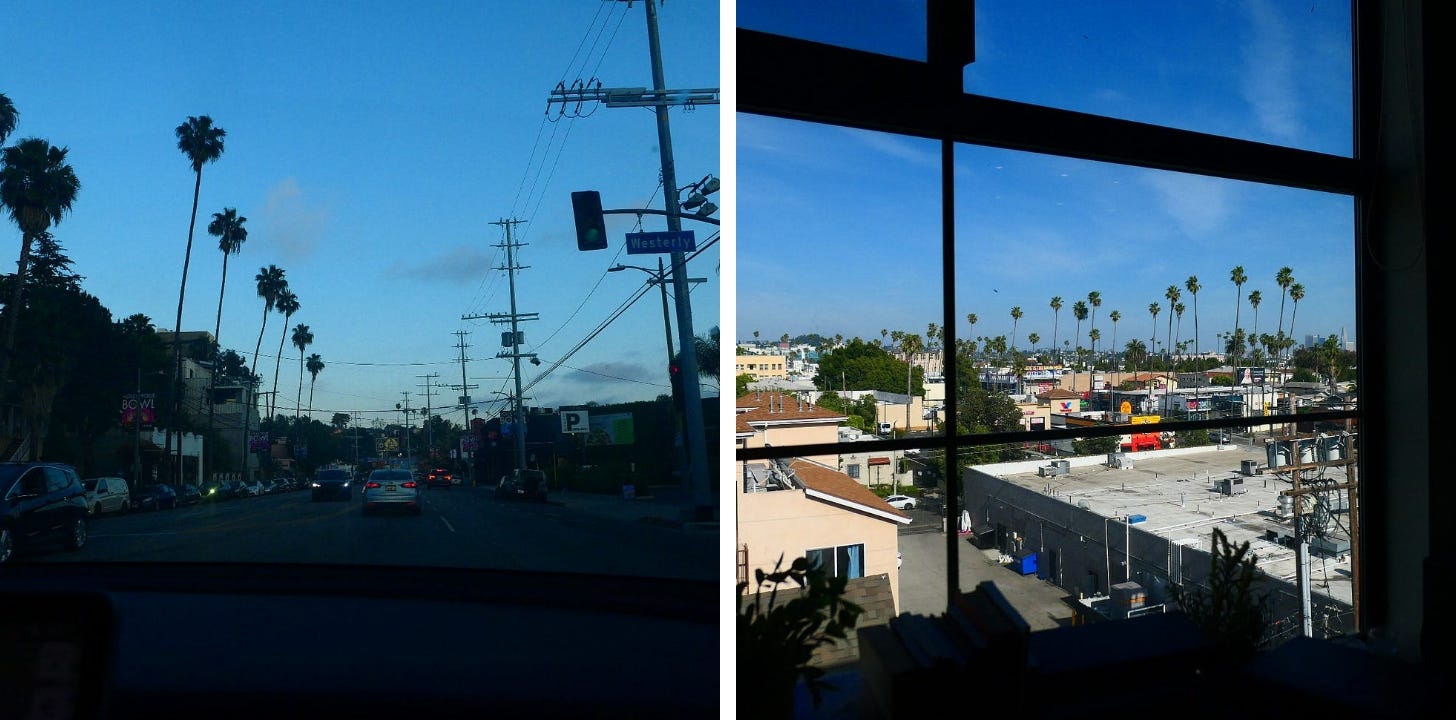 Instead, I was shown to a penthouse apartment with a view of Hollywood’s iconic hillside sign and the palm trees over the street, and he handed me an ice-cold Corona. The man lounged on his plush sofa-chair — and I mean lounged with great style — barefoot and in luxurious repose, answering the telephone with the smooth, brassy voice of a successful Los Angeles man, talking business as the palms waved on the street below us. I heard the word millions more than once; invitations to luncheons, discussions of ‘deals,’ — it was as if some older, former vision of Los Angeles had hung on unbeknownst to me, still living and even thriving. I was in the apartment of someone far wealthier than a man like myself could ever expect to be — and frankly, I liked it far more than I thought I would, though as I listened to the man speak on the telephone, I hadn’t any clue as to whether we’d get along. But whatever stereotypes I might’ve had about those who reside in Angeleno penthouses quickly withered before my eyes as I rested there in his wonderfully-decorated, comfortable living room. As we began to converse, we uncovered a series of fascinating commonalities an outside eye might not expect the two of us to have. For one — he was an unapologetic Los Angeles localist in a manner that felt like an urban analogue of my own love for Upstate New York. While such a formulation as a “localist” in such a giant metropolis may seem oxymoronic given the ‘global’ character of a city like LA, Mr. Juarez was from this place and had grown to appreciate it intensely in his visits to other parts of the world. He perfectly articulated the j’ne se quois of a city often derided as a den of fakery and sin, and while it is not ultimately my place on earth to love, it was clear that it was his — and I appreciated it. And as we spoke, I thought: If a man be from an American city, why should he not love it? Why should a Los Angeles man not muse romantically about the palms and the breeze, the flavors and the architecture and the parks — and of the people who’ve come to enjoy the same? But to enjoy Los Angeles, one must have money — a thing which I have generally regarded as an regrettably necessary inconvenience and a spiritual hazard. And yet, as Gabriel and I conversed, we found that there are (or can be) strange similarities between the one who embraces a quest for wealth and comfort and the one who takes poverty and endurance as his mantle — for both must possess a certain dynamism and vitality that those in the ‘middle regions’ of society either do not or cannot reach for. And therefore, both also share a certain duty to use their position for the greater good; in some regard, the wealthy patron of a beautiful public park is the well-heeled analogue of the penniless poet who lavishes his public with words that could only be formed from so many idle and hungry days. Soon, I met Gabriel’s girlfriend, and the three of us buzzed through the city in their Tesla. They enthusiastically pointed out great landmarks, remarking on the history of the neighborhoods we traveled through, and we ate world-class tacos with great gusto, talking for hours. Often enough, one finds a new friend in the places they least expect — and I was pleasantly surprised by my stay at the Juarez home. Moreover, I was heartened to find myself departing from Los Angeles feeling light and lovely rather than burdened with hatred. Though I will never live in that faraway city, I suppose I am happy that it is there in a way I never thought I’d admit — and I’m certainly happy that Mr. Juarez is there, celebrating his piece of a city that is often misunderstood. Again, I was aboard another overnight train — this time, the Coast Starlight. By now, boarding a train was routine; it was normal. Being off the train was what felt abnormal. As if trapped in an especially acute case of Stockholm Syndrome, the train felt like home — I didn’t even want to get off on fresh air breaks. And by now, my mind was utterly empty. America was passing below my feet at such a ridiculous speed that I couldn’t process it; I went numb instead, staring out the window into a moving postcard, getting cabin fever in a cabin whose windows only show suspiciously scenic computer desktop backgrounds. The chatter with passengers became robotic — my mind was shot from so many speedy miles and so many sleepless nights inside of the flying metal tube called Amtrak. This is when my first real criticism of Amtrak’s USA Rail Pass rose to the surface of my mind — one month is not enough for ten rides. The pass is a dangerous purchase for anyone with a penchant for continuous long-distance travel. It is a liability to any rider who cannot help but use all ten segments on the longest possible routes so as to “get his money’s worth”. If one is tempted in these directions, the routes that the pass makes possible will become utterly irresistable — and as one rides them, they will find this extremely unsettling sense of “numbness” settle in on them like a ghoulish fog. After two full weeks of constant long-haul Amtrak-ing, boarding another train filled me not with joy but with dread; and yet weirdly, I developed a sort of ‘cabin fever’ that immobilized me and made me pine for the train at the same time. For this reason, anyone contemplating a spin with the USA Rail Pass would be wise to restrict themselves to a single region and to limit their long-haul routes to only one or two in a month. As it is currently configured, the Pass is more suitable for making a number of shorter “hops” from town to town. Perhaps the best use of this type of ticket would be to wander across the Northeastern States, or to remain in California only, or to pick one long-haul route and do a leisurely back-and-forth with many stops. But my route eventually jumped the track from leisurely to exhausting. Somewhere around the California-Oregon border, the fatigue was intense, and by the time I got to Eugene, I pined for an extended break from Amtrak. However, I had a wedding to get to in less than two weeks — and in Oregon, I had arranged to meet my estranged father at the circus, which was an exhausting endeavor in and of itself. It became clear to me at this point in the journey that I needed to alter my plans — that I needed to get back east much sooner than originally planned. I had bitten off more than I could chew, booking myself on a tight trancontinental itinerary that would give me an extremely narrow margin of error if I was to arrive at my own wedding in time. Given that several of my trains had been many hours late — an incredible eleven hours late on my train to Los Angeles — I thought it unwise to play fast and loose any longer. And so I booked trains from Eugene, Oregon to Upstate New York in a straight shot, taking the Empire Builder from Portland east to Chicago on the first leg. I wasn’t looking forward to sleeping on trains for three consecutive nights — but the thought of missing our wedding was enough of a motivator to slough through it. 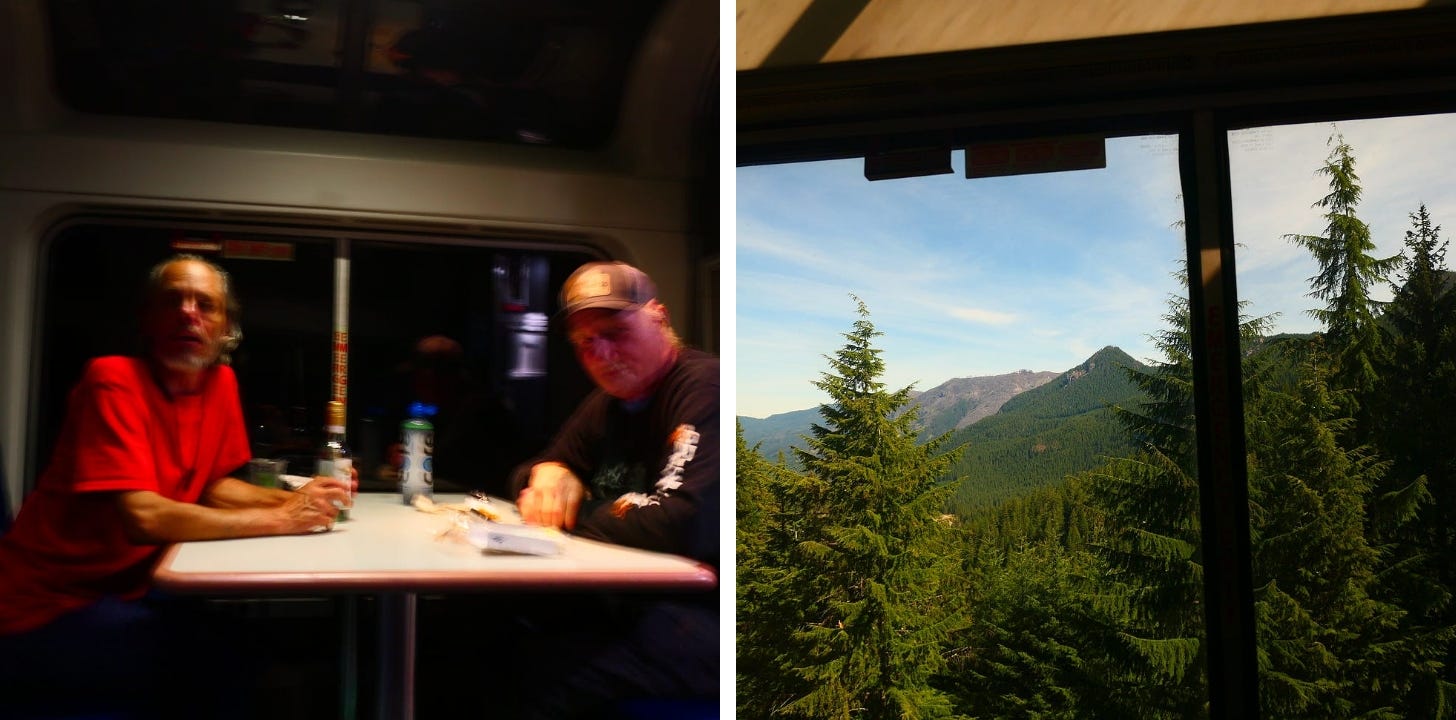 Again, the fugue followed me east, and an aura of passivity gripped me. I flailed in my seat in the observation car, reading a paragraph here and a paragraph there, writing in short snippets only, trapped in a wakeful doze as Amtrak’s red-eyed inmate. As the mountainous scenery billowed skyward and faraway mountains blustered into the visual epitome of mountain West maximalism — I dozed, then rose, then dozed, then rose to get a cup of coffee, then dozed. Zombie-like, I flew eastward, only perking up when it dawned on me that in my current state, I was tasting only the smallest taste of the exhaustion of the Pioneers. My eyes widened again at the Great Plains, reminded of the magnitude of that first journey, musing inwardly at what a thoroughly exhausting country America is. Brutal mountain passes, broken wagon wheels along the buttes, red-eyed horseback rides in Texas and twisted ankles on razor-sharp Virginia ridges — all commanding vigor and virility from all who landed upon the soft eastern shores of this New World. Now, recreationally, I felt a wisp of all this, far removed from frostbite and the terror of nightime bullets and wildfires — feebly clasping a paper cup of coffee before the setting sun’s volcanic din, staring into the softness of my own flesh. And my heart leapt that I was passing above a land that could make me strong; a land in which a man can rise to his most fearless form. Whether an American man be a penitent and a pacifist or a penniless peon with ambitions of pulled-pork Sultanhood in oilfields and desert sandstorms; whether he be a highwayman or a mystic Priest — whether his own loins course madly with the blood of this foreign continent or that one, this is the land where he will be made to rise and to stand upon the spires of surreal mountains and their snakelike trails. It is home to a certain type of man who lives a certain type of way. TSA and Twin Towers, embezzlement and botox and server farms — diabetic Twinkies and giant cigarettes, ritalin and Instagram suicides, diapers along the subway tracks and perverts skulking on the empty streets of Utica — yes, America is delirious, America is tired, but we are only the nation of high highs and low lows. And as I saw the moon rise over the emptying traincar, I wondered if America’s present nadir was only a depression in our glistening surface — if indeed, the implacable optimism of the tireless man on his endless pilgrimage might force our best back to the surface again. My own tiredness waned as I envisioned this; I rose with certainty that the curtain could not yet drop on America — for if our land bears bad fruit in the world of men, it can only be for a few seasons. Land like this cannot lay fallowing forever — land like this braces the soul and reminds man of himself, sending him hurtling upward again. Days passed, and I awoke again in Upstate New York, sauntering along the streets of an old, faltering town with my rucksack heavy on my back in the day’s heat. If my eyelids were heavy, my heart was not — and fatigue was only a nibbling ghost who could be banished easily by my slipping into a walking reverie along the streets of old Rome New York. A few days’ rest would suit me well, a time to ponder and scribble various notes — a closing chapter and time to reflect upon the end of my bachelorhood, and on what might drive me forward in the years ahead. 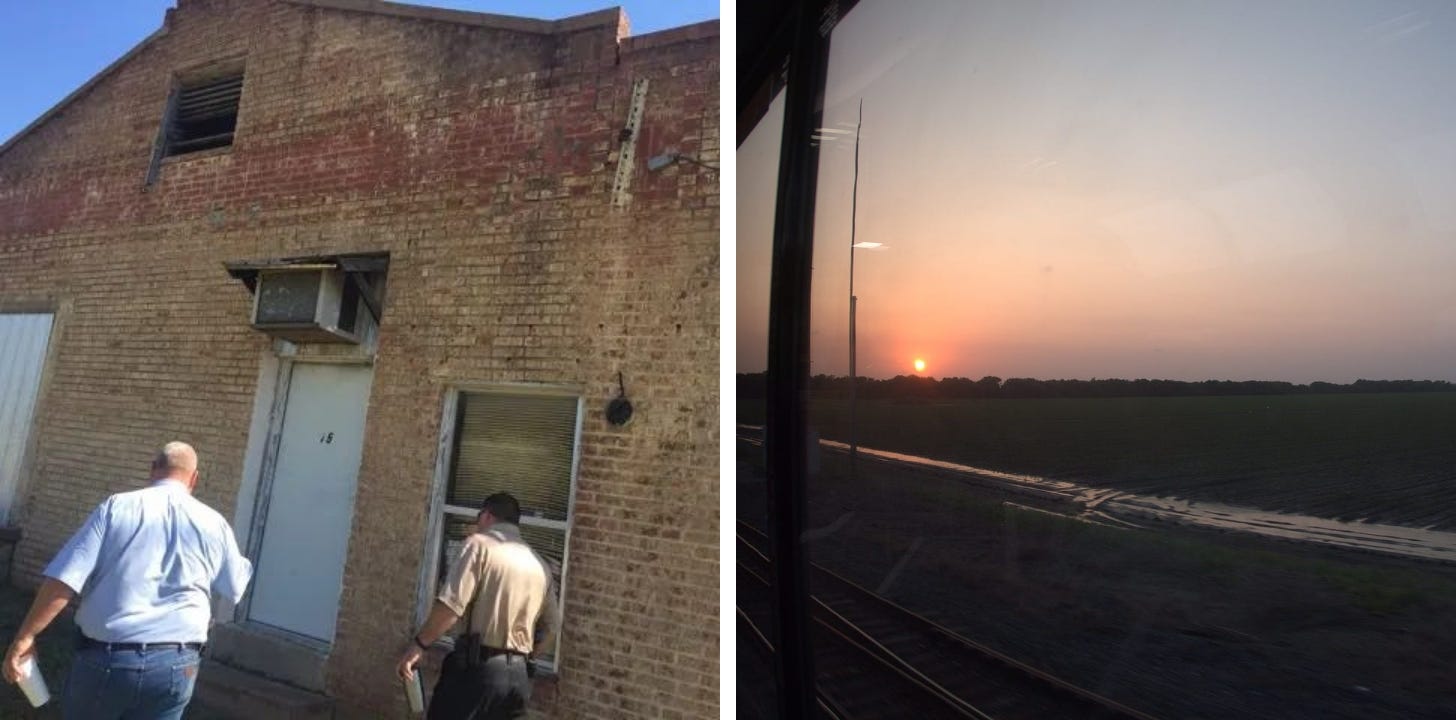 I could only think of those plains, of the tight-fisted mountains along the Monongahela and the wordless glide of Southern bayous — of the helium acreage of wind-lashed high plains and of the first bite of November chill in my native Adirondack foothills. For these are the realms which characterized not only my bachelor years — they are the chambers of a heart which cannot quit America, and must stride as gallantly as they can along her, never tiring in any weather if Providence may grant such to be possible. My life — our life — had thus far been thoroughly American, and now, no anxiety slept in my heart which might rise and demand a change. The Rail Pass itself is akin to a potent hallucinatory drug — it is Uncle Sam’s finest private reserve of heart-shattering, red-white-and-blue moonshine. To click “purchase” is to auction some of oneself to that dutifully-chugging old railroad — it is to dive headlong into this country, enlisting into its chorus to belt some old and oft-forgot song along the straight steel of the rails. Perhaps it could be improved — two months instead of just one might be more on the money — but perhaps the harrying realities of the Pass as it now is are part of it. It may be best to be a little harried — like the immigrant running for a steamer with his bags in Saint Louis, or the trapper who paddles desperately up the Columbia for fear of his sanity. To taste these feverish moments is to sample the story of this country as authentically as it can be sampled — and I would encourage anyone of a constitution capable of sleeping on the coach seats of trains to purchase and use the pass to its fullest extent. There’s a country out there, waiting to tell her story. To buy the USA Rail Pass is to raise one’s hand and say to her — “I’m listening.” You're currently a free subscriber to Hickman's Hinterlands. For the full experience, upgrade your subscription. |